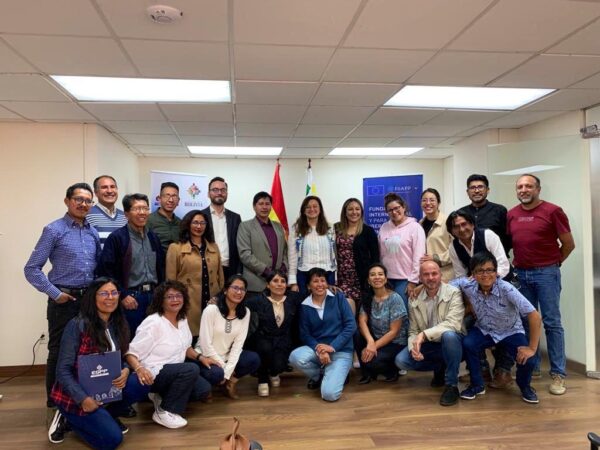-
13 December 2023
Category : Inf first person
Training in journalistic chronicles for social communicators in Bolivia
The chronicle is the closest journalistic genre. In the chronicle, particular human stories tell about common human problems
 Participants and representatives of the EU and the EGPP during the final awards ceremony
Participants and representatives of the EU and the EGPP during the final awards ceremonyThe chronicle does not usually get much space in the media: it requires time, resources, going to places, and the skill to write with care and beauty. That is why we chose the chronicle for the first edition of a journalism training within the FIIAPP’s EU-supported project against drug trafficking in Bolivia. The chronicle is a genre that allows us to delve into sensitive social issues such as drug use, the theme of the workshop, and to approach them from their complexity. The media has a fundamental role in educating society and a great capacity to break (or perpetuate) stigmas.

Cristina García Casado I am Cristina García Casado, journalist, and I was in charge of giving this training, first in La Paz (from 30 to 3 October) and then in Santa Cruz de la Sierra (from 6 to 10 November). I designed it from my journalistic and chronicle library, from what I learned in workshops with masters of the genre such as Martín Caparrós and Leila Guerriero, and from my professional experience of more than 15 years in international media in the United States, Latin America and Spain. The participants appreciated the fact that we proposed a training with a high practical component, given that this is often a lack in journalism studies, despite the fact that it is a profession that can only be learnt by doing. With the participation of the students, we managed to generate dynamic sessions of multidirectional learning.
The training was delivered in collaboration with the Plurinational Public Management School (EGPP) in Bolivia. The profile of the participants was diverse and intergenerational. There were public sector communicators, journalism teachers, working media journalists and students of social communication, which is the name given in Bolivia to the degree course to which journalism and related studies belong. In La Paz, the course was held at the offices of the EGPP, while in Santa Cruz the venue was a training centre of the Spanish Agency for International Development Cooperation (AECID).
“Communication plays a decisive role in understanding the human stories that underpin public policies”
Throughout the training, it was possible to see the importance of tackling projects such as this one against drug trafficking also from the perspective of journalism and communication, two key disciplines when it comes to shaping social narratives and thus combating prejudices and stereotypes that hinder the recognition of problems and the search for solutions. Each of the participants looked for a story related to drug use, reported it, wrote it down and, together, we analysed all of them and drew useful lessons for their respective present and future professional practices.
For me, as a journalist and trainer, this mission has been a very important experience and has motivated me to continue contributing to the public sector and international cooperation through communication. Communication plays a decisive role in understanding the human stories that underpin public policies, since public policies must be designed to improve people’s lives. Missions like this one remind us all that public policies are not something abstract, but that they address the day-to-day lives of citizens in a transformative spirit.
Cristina García Casado, journalist
The views and opinions expressed in this blog are the sole responsibility of the person who write them.




